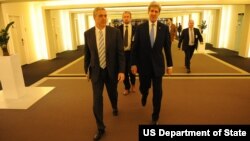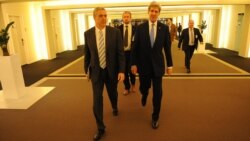2014 will be a pivotal year for the NATO alliance and for the transatlantic relationship, said U.S. Secretary of State John Kerry at the NATO foreign ministerial meeting in Brussels.
There will be three key subjects for discussion at the upcoming NATO summit next September: the way forward in Afghanistan; the capabilities that NATO will need to continue as the most successful political and security alliance that the world has ever seen; and NATO’s critical partnerships with those outside the alliance.
During the ministerial meetings, the 28 NATO members discussed the great progress made in handing over security responsibilities to Afghan troops. NATO remains prepared to continue support for Afghanistan after the NATO combat mission ends next year.
As the combat mission in Afghanistan comes to a close, NATO must continue to invest in the capabilities, the exercises, and the training that will enable the Alliance to best guarantee security and counter threats.
NATO members also spoke about how to energize existing partnerships like the ones that exist with the countries of the Mediterranean and the Gulf, and how to deepen the Alliance’s cooperation with key operational partners, those most capable and willing to deploy with NATO when needed.
The alliance faces new security threats, including cyber-attacks. To guard against these, Secretary Kerry and Foreign Minister Urmas Paet signed a U.S.-Estonia Cyber Partnership Statement that commits both countries to do more together in order to combat this growing security concern.
When NATO was established more than 60 years ago, President Truman remarked, “If there is anything inevitable, if there is anything unconquerable in the world today, it is the will of the people of all nations for freedom and peace.” Since then, NATO has played an absolutely essential role in supporting that will around the globe.
“As we build on. . .our partnerships, our capabilities, and our enduring commitment to Afghanistan,” said Secretary Kerry, “I personally have every confidence that NATO will continue to protect freedom, continue to try to push for and bring about peace, and it will do so for decades to come.”
There will be three key subjects for discussion at the upcoming NATO summit next September: the way forward in Afghanistan; the capabilities that NATO will need to continue as the most successful political and security alliance that the world has ever seen; and NATO’s critical partnerships with those outside the alliance.
During the ministerial meetings, the 28 NATO members discussed the great progress made in handing over security responsibilities to Afghan troops. NATO remains prepared to continue support for Afghanistan after the NATO combat mission ends next year.
As the combat mission in Afghanistan comes to a close, NATO must continue to invest in the capabilities, the exercises, and the training that will enable the Alliance to best guarantee security and counter threats.
NATO members also spoke about how to energize existing partnerships like the ones that exist with the countries of the Mediterranean and the Gulf, and how to deepen the Alliance’s cooperation with key operational partners, those most capable and willing to deploy with NATO when needed.
The alliance faces new security threats, including cyber-attacks. To guard against these, Secretary Kerry and Foreign Minister Urmas Paet signed a U.S.-Estonia Cyber Partnership Statement that commits both countries to do more together in order to combat this growing security concern.
When NATO was established more than 60 years ago, President Truman remarked, “If there is anything inevitable, if there is anything unconquerable in the world today, it is the will of the people of all nations for freedom and peace.” Since then, NATO has played an absolutely essential role in supporting that will around the globe.
“As we build on. . .our partnerships, our capabilities, and our enduring commitment to Afghanistan,” said Secretary Kerry, “I personally have every confidence that NATO will continue to protect freedom, continue to try to push for and bring about peace, and it will do so for decades to come.”

















